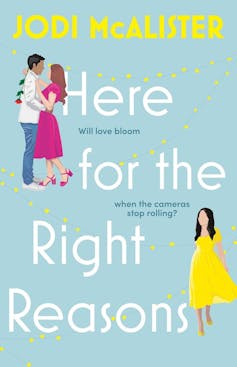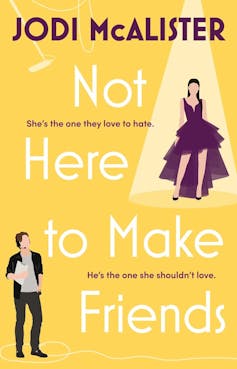By Beatrice Alba, lecturer, School of Psychology, Deakin University
Anyone who has watched The Bachelor will recognise many familiar motifs in Jodi McAlister’s Marry Me, Juliet trilogy – including a splashy, dramatic villain and titles that borrow from reality TV tropes: Here for the Right Reasons, Can I Steal You for a Second? and Not Here to Make Friends. Fans will feel an instant connection with this rom-com series, recently recommended in the New York Times (whose romance columnist “reveled in” the latest instalment). I predict they’ll fall in love with it, as I did.
McAlister, a romance academic whose expertise includes The Bachelor, expertly recreates the journey viewers will be familiar with, with only minor details tweaked. The villainous character of Lily Fireball might even be vaguely reminiscent of a highly entertaining contestant with a similar bluntness and unique moniker – Vanessa Sunshine – from season 6 of The Bachelor Australia.
Jodi McAlister’s Lily Fireball is ‘vaguely reminiscent’ of Vanessa Sunshine from season 6 of The Bachelor Australia.
These three books centre on one season of the fictional reality dating show, Marry Me, Juliet, where a line-up of female contestants vie for the heart of one “Romeo”. The show’s host, Tom Zelig, distributes date cards and guides contestants through Necklace Ceremonies held at the end of Last Chance Parties. Contestants are eliminated when they do not receive a necklace.
Reality TV viewers will delight in the behind-the-scenes experience. Those who watch The Bachelor as a “guilty pleasure” and are critical of some of the more problematic aspects of the reality dating show will also find gratification.
The storyline in each book sensitively considers problems around diversity and representation on reality TV, including issues of sexism, racism, and biphobia. One character even gives voice to common criticisms of the reality dating show: “It’s heteronormative, it’s misogynistic, and on top of that, it’s garbage.”
Despite turning a critical (but loving) lens on the reality show, the novels don’t reveal any evidence to suggest it is inherently misogynistic. This may be because there is nothing to suggest any sexism inherent in the format of the show, beyond what occurs in heterosexual romance more generally.
And while the novels don’t overtly subvert the norms around heterosexual romance, they tell stories of romance that are more egalitarian and unscripted than what we usually find. The central characters, including the Romeo, neither expect nor demand compliance to sexist norms in their romantic encounters.
The series is set at the very beginning of the COVID pandemic – the country is going into lockdown just as Marry Me, Juliet begins filming. Each book follows the same season of the show, but rotates the narration, so we see it through various characters’ perspectives. While each novel is complete within itself, a fuller story of the cast and season builds with each subsequent novel.
Influencer ambitions
The first book, Here for the Right Reasons, introduces us to Cece, who applies to be a “Juliet” during a drunken night with friends. She receives an offer to be a contestant just as the pandemic looms and she finds herself desperate for cash.
Cece is definitely not “here for the right reasons”, as the reality TV trope goes. She’s there to solve her financial problems by gaining Instagram fame and the sponcon (paid social media content) opportunities it will bring. She even dares to dream of starring in her own season of Wherefore Art Thou Romeo?, or its spin-off, Juliet on the Beach.
But hopelessly nervous Cece barely has a chance as a Juliet, let alone as an Instagram influencer. Very much an underdog, she struggles to speak when the cameras are on her.
Cece fumbles through her first meeting with the Romeo on the gravel driveway and fails to make a good impression. After being eliminated in the first Necklace Ceremony, Cece dramatically faints and is literally swept off her feet by the Romeo.
A sudden tightening of pandemic restrictions means eliminated contestants end up being forced to stay on premises. As Cece develops a friendship with the Romeo, he gets to know her vulnerabilities. “You’re a tricky one, Cece,” he observes. “Most people have secret sensitive sides underneath tough exteriors, but you’re the other way around. You’ve got a secret tough exterior.”
Cece grew up in group homes and foster care and has learned to fade into the background. McAlister convincingly presents her experiences of adversity without seeming trite or inauthentic.
As it turns out, the Romeo (the first one of colour) has vulnerabilities of his own. He’s an Olympic athlete determined to present a positive image while also managing panic attacks. His experience provides insights to the challenges faced by people of colour to achieve representation in mainstream media, and the pressure to “get it right” when they do.
The journey towards the Marry Me, Juliet finale is an engaging tale of missteps, where love doesn’t happen at first sight, and sets the scene for the subsequent novels.
Bisexual mechanic ‘wifey’
The second book, Can I Steal You for a Second?, is told by Amanda, a bisexual mechanic who applies on a whim after a sleazy customer suggests she go on Marry Me, Juliet because she’s “hot enough”.
Superficially, Amanda could be just another token blonde, but her kindness and warmth establish her as a potential “wifey” – the contestants who stand out not through sexiness and chemistry, but by displaying the characteristics seen as desirable in a future wife. She’s also highly conscientious and very prone to crying.
McAlister takes us beneath the surface, allowing readers to see Amanda’s complexity. For example, she fears being outed on the show, due to the poor treatment previous bisexual contestants on the show have experienced – and not wanting to be reduced to her sexuality. This is convincingly portrayed.
Amanda is drawn to Hero Nurse Dylan, her fellow contestant and best friend in the Juliet Villa, who always stands up for herself and others – which she admires and envies. Her attempts to suppress her attraction along with her sexuality are a running tension.
Brooke Blurton came out as bisexual on Season 6 of Australia’s The Bachelor.
We also witness Amanda battling her demons as she obsesses over her ex-partner Jac, whose voice still rings loudly in her head. Amanda’s inner world is shrouded by intrusive thoughts about what Jac would say if she were observing Amanda now:
That was how she saw me. How everyone here saw me. Insubstantial. Childish. Ridiculous. “When you told me you were a mechanic, I thought you’d be this hardass, carving out a space for herself in a male-dominated industry,” Jac said to me once, not long before she ended things. “I didn’t realise you were mechanic Barbie. Isn’t there anything underneath the surface, Mandie? Don’t you have any hidden depths?”
Amanda’s story is one of self-development, from a drifter to someone who carves her own path: Mandie 2.0.
The villain we love to hate
In the final book, we are tantalisingly led into the mind of Lily Fireball, the series’ paradigmatic over-the-top villain. Throughout the trilogy, her antics provide the thrills many reality-TV viewers tune in for – the bad-mouthing, the raging narcissism and the hardcore drama. She’s the woman audiences love to hate.
With her diva attitude, the network parochially casts Vietnamese Lily as the “spicy meatball”. But Lily Fireball has an agenda of her own, and soon becomes the antihero. McAlister skilfully weaves in the subtle (and sometimes not so subtle) racism and sexism experienced in the workplace by an Asian-Australian woman.
Lily, we discover, is the estranged best friend of Marry Me, Juliet’s gruff, overworked producer and showrunner, Murray. In this novel, we are also taken into Murray’s perspective. Unsurprisingly, we discover he fancies himself to be a master manipulator, tactically pushing the contestants’ buttons in order to provide the drama.
But he finds himself confronted with a show going off the rails, and the heat of Lily Fireball. Despite all their best efforts to prevent it, the producers and cast find themselves faced with the possibility of having to air a Very Special Episode about racism.
While Lily and Murray might be manipulative psychopaths, they are trying to do the right thing for diversity and representation on the show. This book deftly addresses how a mainstream production can grapple with problems of racism, within both the cast and the upper echelons of the business.
Love rooted in friendship
When we watch reality TV, we don’t know what the actual “reality” is. But in these books, we’re taken behind the bravado, into the contestants’ vulnerability and humanity.
Perhaps the most significant thread in the Marry Me, Juliet series is friendship – not just as an alternative to love, but as fundamental to love.
It shows what love is: being noticed, being seen, being listened to, being understood, being appreciated and being admired for inner qualities. And McAlister contrasts this with all the things love isn’t, like superficial appearances or merely looking good “on paper”.
For those who like The Bachelor, but are bothered by its lack of diversity and vanilla flavour, this book will deliver a far more entertaining and enlightening ride than the real thing.![]()
This article is republished from The Conversation under a Creative Commons license. Read the original article.


